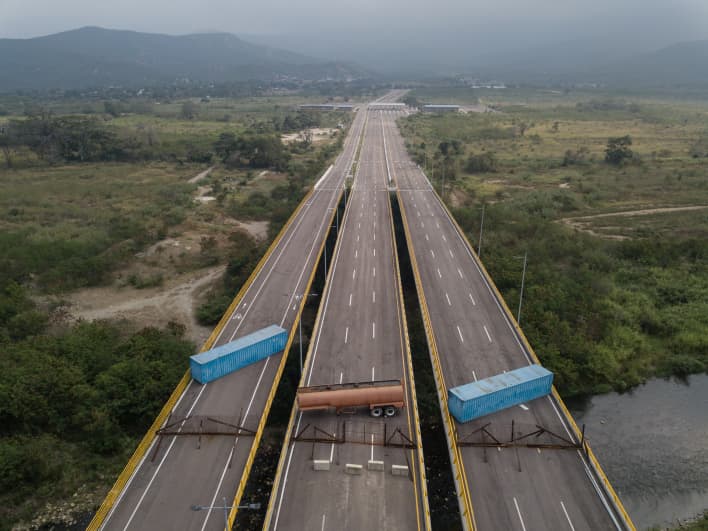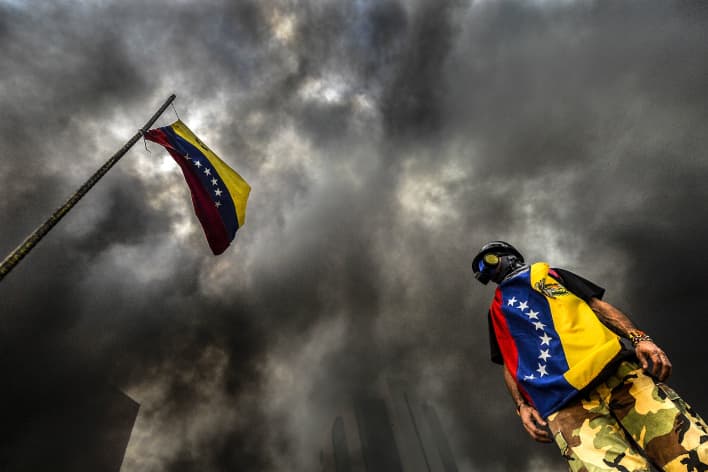Venezuela’s President Nicolas Maduro takes part in a video conference with members of the military in Caracas, Venezuela February 21, 2019.
Miraflores Palace | Handout via REUTERS
President Nicolas Maduro has announced the closure of Venezuela’s border crossings with Brazil, as part of a sustained bid to prevent tens of millions of dollars in humanitarian aid flowing into the country.
Political tensions in Venezuela are reaching boiling point, with the poverty-stricken nation in the midst of the Western Hemisphere’s worst humanitarian crisis in recent memory.
Speaking in a televised address from the country’s largest military base in Caracas on Thursday, Maduro said the border with Brazil would be “completely and absolutely” closed until further notice.
The embattled socialist leader also said Thursday he would consider an imminent shutdown of the country’s border with Colombia.
“It is better to prevent than regret,” Maduro said.
The move comes less than 48 hours before an opposition-led plan to deliver aid from collection points in neighboring countries.
Brazil’s government, which recognizes opposition leader Juan Guaido as Venezuela’s rightful interim president, had pledged to assist with a delivery effort over the weekend.
‘Political show’
On Saturday, hundreds of thousands of volunteers are expected to help Guaido bring in food supplies, hygiene kits and nutritional supplements.
The aid plan is scheduled to take place exactly one month to the day after the National Assembly leader took to the streets of the capital city and declared himself as Venezuela’s legitimate president.
Maduro has refused to cede power, however, and still has the support of the armed forces.
He has consistently rejected letting foreign aid into Venezuela, calling it a “political show” and a cover for a U.S. invasion.
The Brazil-border closure follows a government announcement on Wednesday that it would block air and sea travel between Venezuela and three Dutch Caribbean islands. Guaido had previously cited Curacao, Aruba and Bonaire as aid collections points.
Earlier in the week, Venezuela’s military reaffirmed its support for Maduro, saying they were on “alert” for possible border violations.
Venezuela’s armed forces have so far managed to block shipments of U.S. aid from coming across the border with Colombia.

A gas tank and shipping containers obstructing passage to Venezeula are seen on the Tienditas International Bridge in an aerial photograph taken over Cucuta, Colombia, on Wednesday, Feb. 6, 2019.
Ivan Valencia | Bloomberg via Getty Images
But, Guaido has marked Saturday as the turning point, claiming the aid will enter Venezuela by “one way or another” with the help of more than 600,000 volunteers. He has said he will join activists on the Colombian border, where opposition supporters reportedly plan to storm a bridge barricaded by Maduro.
Underlining the international support Guaido has received in recent weeks, British entrepreneur Richard Branson is scheduled to hold a pro-aid concert just inside Colombia on Friday.
Not to be outdone, Maduro is set to stage a rival concert on the Venezuelan side of the border, reportedly just 300 meters away.
Why is there a plan to deliver humanitarian aid?
As the delivery deadline approaches, the tense standoff between Maduro and Guaido has prompted fears of violence.
In addition to easing a devastating shortage of basic products in Venezuela, the opposition’s proposed move to deliver aid is widely seen as an attempt to undermine Maduro’s authority.
Given the heightened political situation in Venezuela, major international relief organizations have expressed their reluctance when it comes to assisting with the delivery of humanitarian aid.

An anti-government demonstrator stands next to a national flag during an opposition protest blocking the Francisco Fajardo highway in Caracas on May 27, 2017.
LUIS ROBAYO | AFP | Getty Images
The International Committee of the Red Cross and Red Crescent Movement said in a joint statement earlier this month that it could not be seen to take part, citing its shared “fundamental principles of impartiality, neutrality and independence.”
It makes getting basic products into Venezuela, past Maduro’s allied security forces and to those that need the aid most, extremely challenging.
Pressure is building on Maduro to step down. The socialist leader has overseen a long economic meltdown, marked by hyperinflation, mounting U.S. sanctions and collapsing oil production.
As a result, some three million Venezuelans have fled abroad over the past five years to escape worsening living conditions.

Comments
Post a Comment